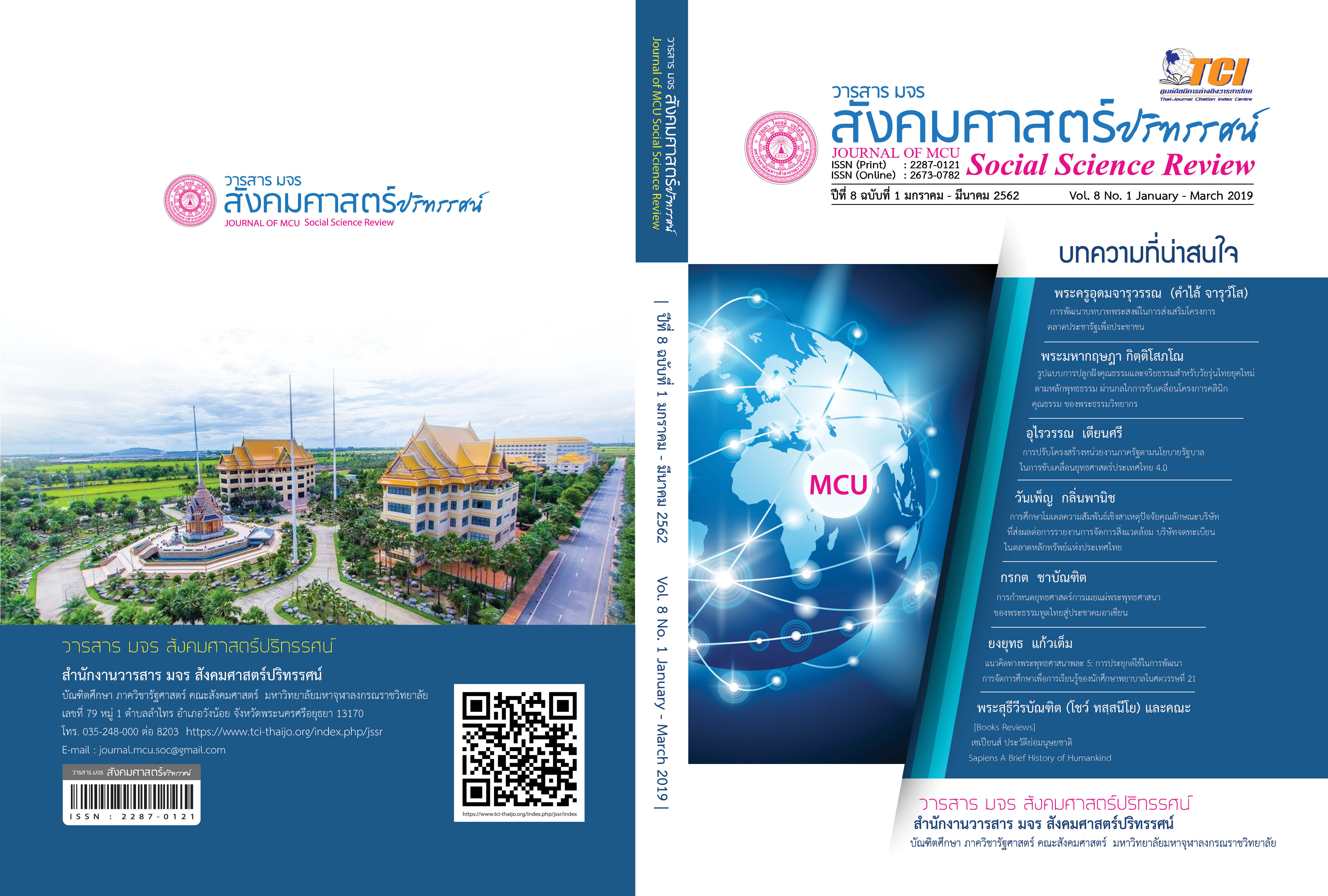การพัฒนาบทบาทพระสงฆ์ในการส่งเสริมโครงการตลาดประชารัฐ เพื่อประชาชนในกรุงเทพมหานคร
คำสำคัญ:
การพัฒนา, บทบาทพระสงฆ์, โครงการตลาดประชารัฐบทคัดย่อ
บทความนี้มีวัตถุประสงค์ 1) เพื่อศึกษาวิเคราะห์สภาพทั่วไปของโครงการตลาดประชารัฐเพื่อประชาชนในปัจจุบัน 2) เพื่อศึกษาบทบาทของพระสงฆ์ในการส่งเสริมโครงการตลาดประชารัฐเพื่อประชาชนในกรุงเทพมหานคร และ 3) เพื่อนำเสนอการพัฒนาบทบาทของพระสงฆ์ในการส่งเสริมโครงการตลาดประชารัฐเพื่อประชาชนในกรุงเทพมหานคร โดยใช้แบบสัมภาษณ์เชิงลึก
(In-depth Interview) ผู้ทรงคุณวุฒิ ผู้เชี่ยวชาญ และผู้มีส่วนได้ส่วนเสีย และการสนทนากลุ่ม (Focus group discussion) ผลการวิจัยพบว่า 1. สภาพทั่วไปการขับเคลื่อนโครงการตลาดประชารัฐเพื่อประชาชน ตามรูปแบบของ CIPP Model “ตลาดประชารัฐ” ที่เปิดให้บริการ ตามนโยบายของรัฐบาล ภายใต้บูรณาการความร่วมมือทุกภาคส่วนที่เกี่ยวข้อง ทั้งในส่วนกลาง และส่วนภูมิภาค ซึ่งดำเนินงาน ในรูปแบบประชารัฐ เพื่อส่งเสริมการเพิ่มพื้นที่ตลาดใหม่ รวมทั้งขยายพื้นที่ตลาดเดิม สำหรับรองรับการจัดจำหน่ายสินค้าที่กระจายตัวอย่างทั่วถึง สามารถสนับสนุนให้พี่น้องประชาชน เกษตรกร ผู้มีรายได้น้อย รวมถึงกลุ่มอาชีพต่างๆ ได้มีโอกาสค้าขายมากขึ้น ลดต้นทุนทางการตลาด และเปิดโอกาสให้กับผู้ค้ารายใหม่ ได้มีพื้นที่จำหน่ายสินค้าเพิ่มมากขึ้น ตามแนวคิดของโครงการซึ่งสอดคล้องกับวัตถุประสงค์ เพื่อให้การดำเนินการตามแนวทางประชารัฐสำเร็จผลอย่างเป็นรูปธรรม เกิดประสิทธิภาพ ประสิทธิผลสูงสุด 2. บทบาทของพระสงฆ์ในการส่งเสริมโครงการตลาดประชารัฐ เพื่อประชาชนในกรุงเทพมหานคร ของมหาเถรสมาคม ปัจจุบันมีโครงการนำธรรมะเข้ามาบริหารตลาด เพื่อให้มีการนำคำสอนทางพระพุทธศาสนาไปประพฤติปฏิบัติให้มีคุณธรรมจริยธรรมในการค้าขาย และการประกอบอาชีพอย่างมีความสุข และ 3. การพัฒนาบทบาทของพระสงฆ์ในการส่งเสริมโครงการตลาดประชารัฐเพื่อประชาชนในกรุงเทพมหานคร ใน 3 ด้าน คือ (1) ควรให้พระสงฆ์มีการเข้าอบรมหลักสูตรต่าง ๆ เพื่อทำให้รู้ว่าวัดที่มีโครงการตลาดประรัฐจะต้องมีการปรับปรุงอะไรบ้าง และจะต้องควบคู่กับหลักธรรมทางพระพุทธศาสนา (2) ควรมีการให้การศึกษาแก่พระสงฆ์ที่เกี่ยวกับโครงการตลาดประชารัฐเพื่อที่ทำให้พระสงฆ์ทราบหลักเกณฑ์และกลไกในการเข้าร่วมโครงการตลาดประชารัฐอย่างเป็นระบบ (3) ควรมีการพัฒนาบทบาทที่ตรงกับเป้าประสงค์
โดยการศึกษาดูงาน แลกเปลี่ยนความรู้กับวัดหรือชุมชนที่ประสบความสำเร็จเกี่ยวกับการบริหารตลาดประชารัฐ จะทำให้สามารถนำมาประยุกต์และปรับใช้ให้เป็นประโยชน์ต่อตลาดที่ตนเองดูแลรับผิดชอบ
เอกสารอ้างอิง
Arthur E. Fink. The Field of Social Work. (1994).New York : Holt, Rinehart and Winston.
Kanungnit Chantabutr and Suban Chantabutr. (2002). Principles Management and Administration of Temple in Globalization. Bangkok : Prikwhan Graphic.
Mahachulalongkornrajavidyalaya University. (1996). Tripitaka Mahachulalongkorn-
rajavidyalaya University. Bangkok : Mahachulalongkornrajavidyalaya Publisher.
National Office of Buddhism. (2016). Conclusion the Sangha Supreme Council of Thailand. Bangkok : National Office of Buddhism Publisher.
Patt Bunyarattanapan. (2004).Community Empowerment by Community Development Movement. 2nd ed. Bangkok : Thai Watana Panich.
Stufflebeam, Daniel L.; and Shinkfield, Anthony J. (2007).Evaluation Theory, Models, & Application. San Francisco : John Wilwy.
Udom cherykeewong. (2009). Ecotourism. Bangkok : Seangdao.
Vilai Tangchitsomkit. (2005). Development of Communities. 2nd Ed. Bangkok : Odeon Store,
ดาวน์โหลด
เผยแพร่แล้ว
รูปแบบการอ้างอิง
ฉบับ
ประเภทบทความ
สัญญาอนุญาต
ลิขสิทธิ์ (c) 2019 วารสาร มจร สังคมศาสตร์ปริทรรศน์

อนุญาตภายใต้เงื่อนไข Creative Commons Attribution-NonCommercial-NoDerivatives 4.0 International License.
เพื่อให้เป็นไปตามกฎหมายลิขสิทธิ์ ผู้นิพนธ์ทุกท่านต้องลงลายมือชื่อในแบบฟอร์มใบมอบลิขสิทธิ์บทความให้แก่วารสารฯ พร้อมกับบทความต้นฉบับที่ได้แก้ไขครั้งสุดท้าย นอกจากนี้ ผู้นิพนธ์ทุกท่านต้องยืนยันว่าบทความต้นฉบับที่ส่งมาตีพิมพ์นั้น ได้ส่งมาตีพิมพ์เฉพาะในวารสาร มจร สังคมศาสตร์ปริทรรศน์ เพียงแห่งเดียวเท่านั้น หากมีการใช้ภาพหรือตารางหรือเนื้อหาอื่นๆ ของผู้นิพนธ์อื่นที่ปรากฏในสิ่งตีพิมพ์อื่นมาแล้ว ผู้นิพนธ์ต้องขออนุญาตเจ้าของลิขสิทธิ์ก่อน พร้อมทั้งแสดงหนังสือที่ได้รับการยินยอมต่อบรรณาธิการ ก่อนที่บทความจะได้รับการตีพิมพ์ หากไม่เป็นไปตามข้อกำหนดเบื้องต้น ทางวารสารจะถอดบทความของท่านออกโดยไม่มีข้อยกเว้นใดๆ ทั้งสิ้น





